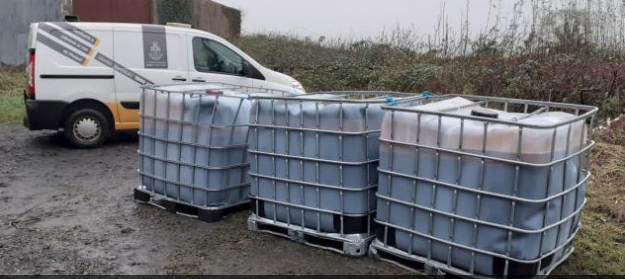Figures released by the Department of Environment show the total cleanup cost of diesel laundering in both counties was €1,127,726.
At least €837,919 has been spent by Louth County Council on cleaning up dumped sludge since 2018.
Since 2018, Revenue have detected seven fuel laundering plants in both Louth and Monaghan, and have seized a total of 83,500 litres of laundered diesel. Four of these plants were located in Louth while three were in Monaghan.
In 2021, there were a total of 62 incidents of diesel laundering detected in both counties, according to the Department of the Environment. Of these, 39 took place in Louth while another 23 took place in Monaghan.
Diesel laundering is the process of washing out a green dye that is placed in rebated green fuel, or marked mineral oil, to make it colourless.
The process is carried out using a bleaching agent and leaves a residue within the fuel, which can solidify when heated in an engine and cause serious damage to the internal workings of a car.
According to Revenue, the difference in the rate of tax is high. The Mineral Oil Tax (MOT) on diesel is €535,46 per 1,000 litres, while it is €138.17 on marked mineral oil, meaning those selling agricultural diesel can profit from the difference of almost 40 cent per litre of fuel.
Within the process of laundering diesel, a sludge is created that is typically dumped and left for local authorities to dispose of.
Revenue says that their current strategy around combating fuel laundering works around supply chain reporting, a monitoring system for retailers and suppliers, tightening fuel licensing and the power to revoke or refuse licences.
In 2015 Accutrace S10 was introduced – a colourless marker that has chemical properties similar to that of diesel that makes it resistant to conventional dye-washing techniques.
This compound is required to be added to any supply of reduced rate fuel, in addition to other dyes, in both Ireland and the UK.
The Department of Environment, Climate & Communications said the sludge can cause “significant hydrocarbon contamination” in soils and that it can also contaminate groundwater.
“Furthermore, the acidic waste generated from other materials in this illegal process and left abandoned by diesel launderers such as sulphuric acid wash, contaminated absorbent and bleaching earth sludge is hazardous waste,” the spokesperson added.
“The illegal deposition of waste material arising from diesel laundering activities presents local authorities with major difficulties, as the task of cleaning up the material needs to be dealt with to avoid threats to the environment.”








